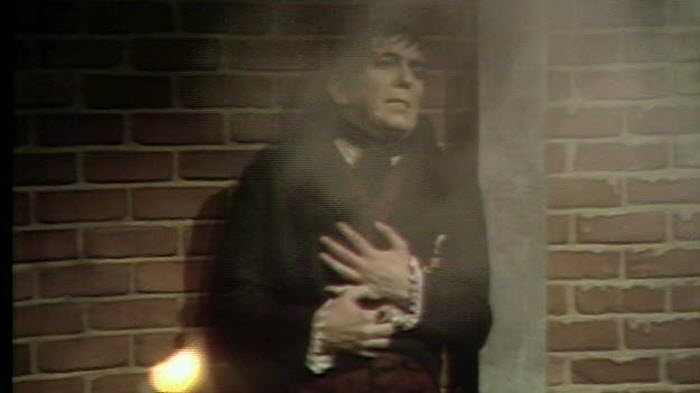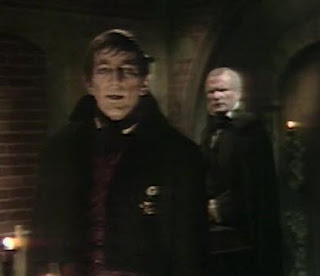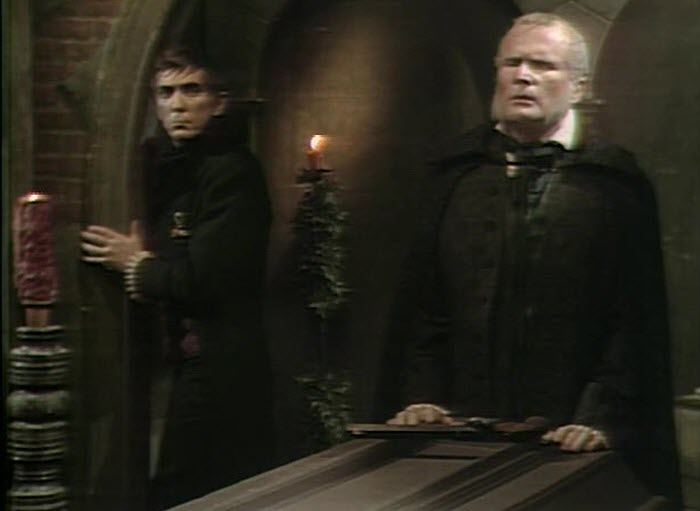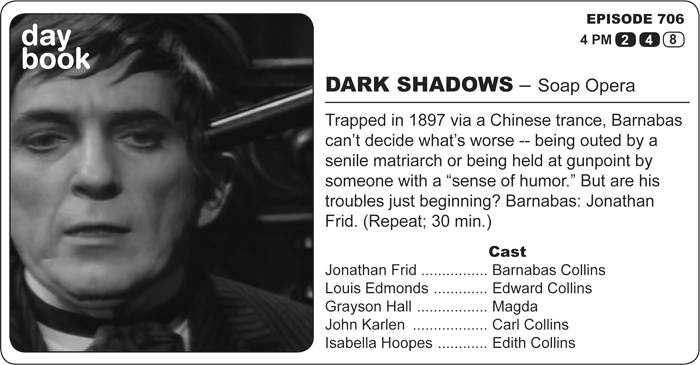
By PATRICK McCRAY
Taped on this date in 1968: Episode 446
When Barnabas reveals his nocturnal activities to Joshua, will the patriarch find the inspiration to shoot? Joshua: Louis Edmonds. (Repeat; 30 min.)
Joshua learns of Barnabas’ curse. He charges his son with killing himself when he must lead a confused Naomi back to Collinwood. After dealing with a subtle blackmail attempt from Nathan Forbes, Joshua returns to Collinwood where he shoots Barnabas.
 Episode 446 goes to the heart of one of Dark Shadows’ real nightmares, and that’s the inevitable horror of worlds colliding. All horror deals with the dance between the sacred and the profane, but this show heightens the tension by casting the sacred with the epitome of American civilization. As Quentin tells Barnabas, “There is no English branch of the family.” The Collinses are wealthy, landed, sophisticated, and live in a castle forged from the hard-won fruits of capitalism. They may honor the dead, but their home is a monument to living. Confronting them with horror is to confront America with horror, and cloaking them in the sanctity of economic power makes them even more American than the Cleavers. Because, by god, they Made Something of Themselves.
Episode 446 goes to the heart of one of Dark Shadows’ real nightmares, and that’s the inevitable horror of worlds colliding. All horror deals with the dance between the sacred and the profane, but this show heightens the tension by casting the sacred with the epitome of American civilization. As Quentin tells Barnabas, “There is no English branch of the family.” The Collinses are wealthy, landed, sophisticated, and live in a castle forged from the hard-won fruits of capitalism. They may honor the dead, but their home is a monument to living. Confronting them with horror is to confront America with horror, and cloaking them in the sanctity of economic power makes them even more American than the Cleavers. Because, by god, they Made Something of Themselves.But other than display Buckwheatean fright, what else is the sacred supposed to do when the profane decides to stretch out on the couch, grab the remote, and announce it’s there to stay? Exactly. And that’s the limit of horror. But not on Dark Shadows and not on episode 446. Call it turgid or call it intellectual, but in Collinsport, horror speaks and horror listens. Barnabas speaks and Joshua listens. And vice-versa. Perhaps we can thank the strictures of standards and practices or the lightyear-long format of soap opera storytelling. Either way, that chance for a dialogue is a chance to pause and think about what gives the profane its profanity. And by profanity, I simply mean otherness.
When Barnabas fesses up to Joshua, substitute anything uncomfortable between generations and sensibilities for “vampire” and you’ll see what I mean. In the words of John Wayne, homosexuality is the obvious choice, but the idea of otherness is hardly restricted to that. What’s amazing is that, while Joshua obviously rejects his son’s new diet, he doesn’t necessarily reject his son. It would be a poor choice as a human and as a prominent figure in a narrative. Inevitable? Maybe, but Joshua tries everything in between. And by “everything,” I largely mean encouraging his son to kill himself. Even when Joshua pulls the trigger, it’s as much to confirm Barnabas’ inhumanity as to end it.

Few suffer like Joshua, and with standards like his, he sets himself up for it. But these standards are tempered by a depth of reluctant compassion that few on the program share. These are traits that his son will inherit as he manages his own ad hoc family of Julia and Willie in the twentieth century. Like so much in Dark Shadows, the extremes he reaches in the attempt to rationalize Barnabas go to the farcical. For all of it’s drama, it’s a legitimately funny episode. Barnabas has some wonderful takes as he listens to Joshua’s suggestion that all will be made right by a fair trial. More, later, when he tries to coax Joshua into coming to the vampire conclusion without saying “the word,” a bit like an occult version of $20,000 Pyramid.
But the episode is hardly about only Joshua. Barnabas’ plight demands that viewers see events through his eyes, also. Because this isn’t a veiled metaphor for something like homosexuality. This is about a life that requires killing others. The choices have a cruel honesty to them. Barnabas is feeding off of the poor, and class differences have already dehumanized them in the eyes of his echelon. Yes, yes, it’s outrageous, his fellows might secretly opine, but that’s what they’re there for. The shocking message of Barnabas is that he’s just making the suggested into the literally, and doing so in the frankest way. Maybe that’s the secret reason Barnabas is, at once, so cold and yet so passionate about his crimes. He’s shocked that he doesn’t care more. Barnabas’ attacks correspond less with his biological needs and more with his emotional life. We see him as a vampire, off and on, all the time. He’s not always feeding, and it’s clear that he doesn’t really need to. In fact, he stops himself with little consequence all the time. He’s rationalizing his crimes with what may or may not be an impulsive thirst. Perhaps he’s ultimately looking for an end from Joshua or at least his understanding. If we look at what Barnabas does for the lion’s share of the series, it’s make up for this dark impulse. Barnabas gets labeled as a mere serial killer, “The Collinsport Strangler,” but evidence suggests that, because he doesn’t need to kill (as often) that may actually be what he is.
The thousand yard stare which Barnabas gets when contemplating his crimes may not be from the fact that he couldn’t help it, but that he could.
This episode was broadcast March 11, 1968.

